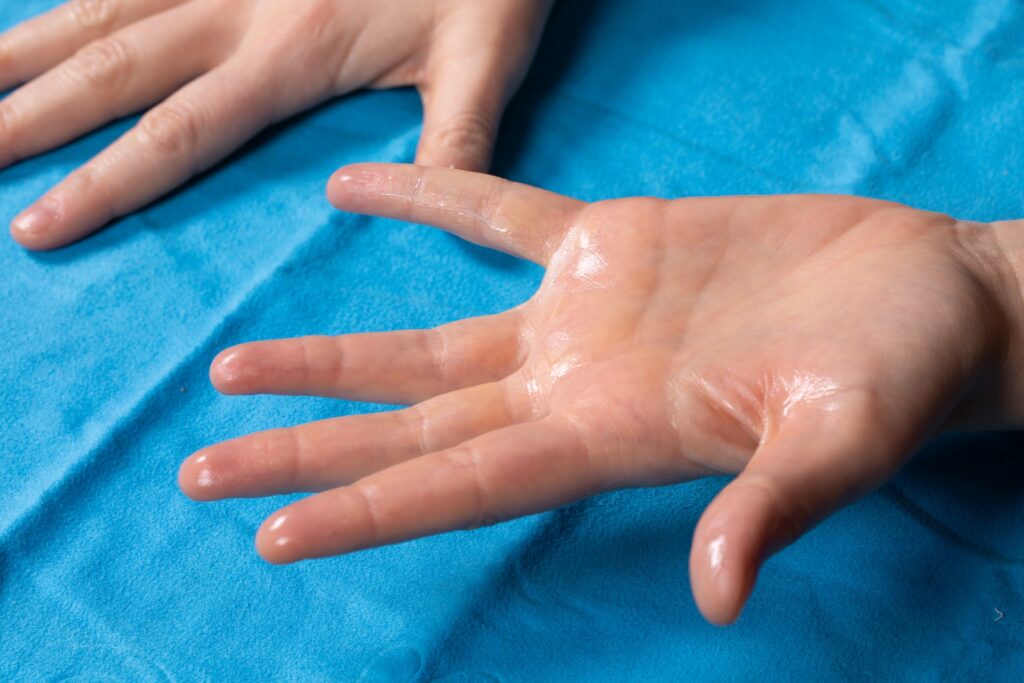Excessive Sweating May Indicate Hyperhidrosis

If you have ever met someone who said they don’t want to shake your hand because their hands are always sweaty, they may have hyperhidrosis. Hyperhidrosis is not contagious or life-threatening, but it is a significant source of insecurity, anxiety, and embarrassment for many with this condition. The symptoms can be unrelenting, and this condition is not curable. However, as more doctors and scientists work together, treatment options are available that offer some relief. There is value in understanding what causes hyperhidrosis, the symptoms, and treatment options.
Identifying Hyperhidrosis
Hyperhidrosis may be primary or secondary, and an experienced professional can diagnose it. The cause of primary hyperhidrosis is not known, but it appears to have genetic ties. Secondary hyperhidrosis can be caused as a side effect of medications and other health issues.
Excessive sweating may be localized, such as only on the hands or feet, or generalized, affecting the entire body. Areas of the body with many sweat glands are prone to the symptoms, including armpits, faces, heads, arms, and feet. There is not enough data to support whether or not this condition shows up early or later in life, but it does affect 3% of Americans between 20 and 60 years of age.
Hyperhidrosis Symptoms
It is thought that hyperhidrosis is underdiagnosed and reported, leaving many who suffer from these chronic symptoms in the dark. As more light is shed on this condition, support resources become available, and treatment options are shared.
Chronic sweating, which causes daily activities to be interrupted, is considered a strong indicator of this condition. When individuals experience greater than six months of excessive sweating, with episodes lasting seven days or more, they may have hyperhidrosis and want to seek professional guidance for diagnosis and treatments. Clammy hands and feet, sweat that soaks clothing with minimal activity, and frequent sweating on the face and head are signs of hyperhidrosis. A side effect of this condition is bacterial and fungal infections because the skin never gets a break from the moisture, leading to infections.
Signs of Someone Suffering from Hyperhidrosis
There is a psychological toll hyperhidrosis takes on most people who have it because it causes people not to want to engage with others; isolation and loneliness can mentally impact a person, and this is why spreading knowledge about the condition and encouraging people to seek treatment is essential. There are several symptoms of hyperhidrosis that are not sweating, and those include hesitation to make physical contact, acting embarrassed or self-conscious, withdrawing socially, depression, anxiety, and worrying about stained clothing and body odor.
The best advice is to treat people with care and not make them feel more self-conscious about this condition than they already do.
An Accurate Diagnosis
Because the cause of primary hyperhidrosis is unknown, secondary hyperhidrosis may be triggered by another health condition or medications, so getting a diagnosis is critical to moving forward. Only a professional can order blood and imaging tests to rule out secondary hyperhidrosis, provide insight into whether excess sweating is primary or secondary, and explore treatment options with patients.
Antibiotics, antidepressants, and insulin can cause secondary hyperhidrosis. Common health conditions associated with symptoms of hyperhidrosis are diabetes, hyperthyroidism, and Parkinson’s. Specific medical procedures, pregnancy, menopause, heart failure, and alcohol abuse can also be linked to excessive sweating that meets the criteria for secondary hyperhidrosis.
Risks Associated with Hyperhidrosis
One risk associated with hyperhidrosis is dehydration because the body is mostly water. Individuals who have hyperhidrosis will have these symptoms throughout the year. Suppose an individual does have hyperhidrosis and does not seek treatment. In that case, they may need to consider ways to ensure their bodies stay hydrated, especially if they exercise more than 60 minutes a day or in hotter months when the body is losing water and electrolytes.
Other risks include psychological distress, eczema, psoriasis, and skin infections. A local dermatologist specializing in treating these and other skin conditions can effectively treat concerns over skin conditions that appear due to hyperhidrosis. Managing the condition can help people regain their quality of life and boost mental health.
Natural and Medical Treatments
Many people prefer natural treatments for health and skin conditions. The good news is that people have reported improved symptoms using non-prescription options, like antiperspirants and armpit shields, being mindful and selective in clothing and shoe materials (natural instead of synthetic can reduce sweating), and avoiding or limiting common triggers like spicy foods and alcohol. However, medical treatments are available if these changes do not change the symptoms.
When seeking medical help with hyperhidrosis, suggestions may include Botox injections, surgical procedures, prescribed medications, and electric current therapy.
When suffering from any skin or health condition that limits your lifestyle and adversely affects your psyche, it is worth seeking professional help. Whether seeking guidance from a licensed dermatologist or a medical professional, take the first step to getting your life back. Everybody deserves to live their best life, and there are treatments for most skin conditions to minimize symptoms.
Want to visit a local dermatologist in Atlanta? Buckhead Dermatology has excellent bedside manners and a reputation of excellence throughout Atlanta.
